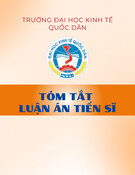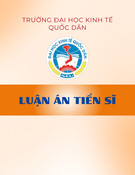
HO CHI MINH NATIONAL ACADEMY OF POLITICS
NGUYEN THI THU HA
IMPLEMENTING THE LAW ON
WOMEN’S POLITICAL RIGHTS IN VIETNAM
SUMMARY OF DOCTORAL THESIS
Field of study: Theory and History of the State and the Law
Code: 62 38 01 01
HA NOI - 2018

The thesis was completed at
Ho Chi Minh National Academy of Politics
Supervisors:
1. ASSOC. PROF., DR. NGUYEN THI BAO
2. DR. LE DINH MUI
Reviewer 1
Reviewer 2
Reviewer 3
The thesis shall be defended in front of the Thesis Committee at
Academy level at Ho Chi Minh National Academy of Politics
At date month year 2018
The thesis can be found at the National Library and
The Library of Ho Chi Minh National Academy of Politics

1
INTRODUCTION
1. The necessity of the thesis
In Vietnam, paying attention to women’s works is a consistent viewpoint
of the Party and State throughout the revolution. In the Testament, President Ho
Chi Minh wrote: In the cause of fighting against America, saving the country,
our country’s women made great contribution in combat and in production. The
Party and the Government need to have a practical plan to foster, raise and help
so that more women are in charge of every job, including leadership jobs.
Women themselves must strive to rise. It is a revolution that leads to true
equality for women.
In particular, during the Doi moi period, the Party's policy on gender
equality and women's empowerment was reflected throughout the resolutions of
the Party Congress, resolutions and directives of the Party Central
Committee, the Politburo, The Secretariat on mass work, the mobilization of
women, the work of female cadres. From the policy of the Party, the State
has promulgated a number of specific policies and laws to create conditions
for women to develop and promote gender equality, in which the most
important thing is to ensure and create conditions for Vietnamese women to
exercise their political rights.
Equality between men and women was determined right from the first
constitution of 1946 by the Democratic Republic of Vietnam. This issue
continues to be inherited in the 1959, 1980, 1992, and 2013 Constitutions, and
is subject to specific laws and regulations. A series of legal documents of the
State have been issued to enhance the status of women in society and to
implement gender equality such as the Civil Code, Labor Code, Marriage and
Family Law, the Population Order, The Law on Gender Equality, the Law on
Domestic Violence Prevention and Control, etc. The legal system and policies
on women have been increasingly improved, especially with the promulgation
of the Constitution 2013, Human rights in which women's rights are asserted to
be important motivators for social development. In line with the promulgation
of the law, Vietnam ratified and acceded to the Universal Declaration of Human
Rights in 1948 and most of the fundamental international treaties on human
rights, including conventions relating to women's rights such as the
International Covenant on Civil and Political Rights (1966), the Convention on
Economic, Social and Cultural Rights (1966), the Convention on the

2
Elimination of All Forms of Discrimination Against Women Against Women
(1979, CEDAW); Convention on the Rights of Persons with Disabilities ...
Laws of Vietnam basically have internalized international standards on
human rights, including women's political rights, in line with the general
development trend of humanity and the Vietnamese characteristics, therefore
motivated women to overcome obstacles to meet practical requirements, affirm
their position in the family and in society. Results of election of deputies to the
XIV National Assembly, women accounted for 26.6% of the total delegates.
This is a high percentage of votes cast in the National Assembly and has placed
Vietnam as one of the countries with the highest percentage of female
legislators in Asia and the world (over 25%). The ratio of female deputies to the
National Assembly in our country is higher than that of China, India, Japan and
many other countries in the region. According to the Union of Parliaments,
Vietnam was ranked 37th out of 188 countries in the world in terms of
percentage of women in the legislature (as of January 31, 2011, basing on
reports of different countries’ legislatures).
However, in addition to the achievements made in ensuring that women
are exercising the rights provided for by law, it must be recognized that the
implementation of the law on women's rights, including political rights, still has
many limitations. Although Vietnam was ranked high in the world in terms of
percentage of female deputies, there is still a large gap between male and
female (73.4% and 26.6%); Especially in the percentage of women holding key
positions (chief level). There are still barriers from family and society towards
women when participating in social and political works. The proportion of
women attending the government has not met the requirement; Discrimination
on the career advancement opportunities for women leads to a lack of
leadership and management of women remains a major challenge; Laws on
political rights and public morality on women's political rights in our country
are not fully recognized as a tool for the management of society and the
protection of legitimate rights and interests of women. Violation of the law on
women, especially violations of the law on women's political rights still occurs
in some places, which hinder the process of promoting democracy,
strengthening legislation, building a socialist rule-of-law state, going against the
good nature of the society that we are building.
The shortcomings mentioned above are due to the following reasons: The
legal system of women's political rights is lack of synchronism with low

3
feasibility; awareness of subjects regarding women's political rights is not
sufficient; Capacity of the subjects in implementing the law is limited; The
work of directing, inspecting and supervising the delay of the implementation
of the law is insufficient and indecisive in handling, which leads to improper
and inadequate implementation.
The question is why Vietnam is considered one of the countries with a
good legal system from the perspective of gender equality, but the proportion of
women attending the government tends to decrease, the shortage of women's
participation in the 2015-2020 term mandate, including the term 2020-2025, is
a reality at all levels; The voice of women in important areas of the country has
not been emphasized ... This poses the need for research to find out the results,
limitations and causes of results, limitations in implementing the law so as to
propose solutions to ensure the implementation of political rights of women in
Vietnam.
Thus, the PhD candidate selects the topic: "Implementation of the law on
political rights for women in Vietnam today" to study within the scope of
doctoral thesis on law, specialized in the theory and history of the State and the
law.
2. Research purposes and research tasks
2.1. Research purposes
From studying the theories and practices of the implementation of
political rights of women in Vietnam nowadays, the thesis explains and defines
the perspectives and solutions to ensure the implementation of political rights of
women in Vietnam today.
2.2. Research tasks
To achieve the above purposes, the dissertation shall perform the
following tasks:
Firstly, to analyze, clarify the concept of political rights, the law on
women's political rights; Subjects, contents, forms, roles, factors guaranteeing
the implementation of political rights of women; drawing open remarks for
Vietnam from the experiences of implementing political rights of women in
some countries in the world.
Secondly, analyzing to show the results, limitations, causes of the results
and constraints of the law and the implementation of political rights of women
in Viet Nam nowadays.


























